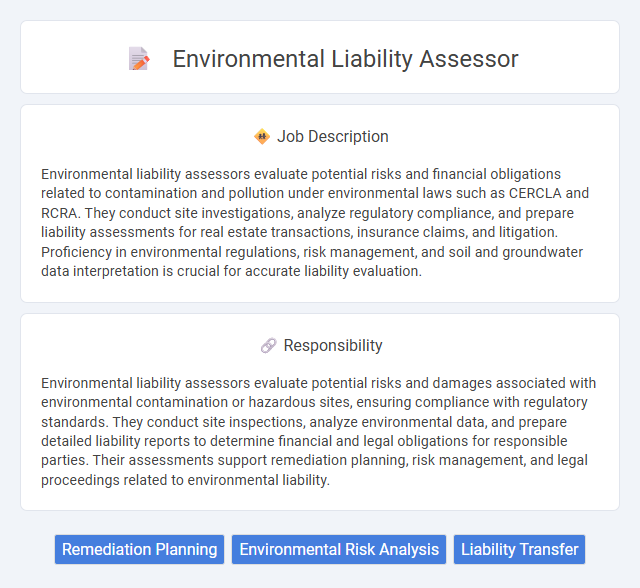
Environmental liability assessors evaluate potential risks and financial obligations related to contamination and pollution under environmental laws such as CERCLA and RCRA. They conduct site investigations, analyze regulatory compliance, and prepare liability assessments for real estate transactions, insurance claims, and litigation. Proficiency in environmental regulations, risk management, and soil and groundwater data interpretation is crucial for accurate liability evaluation.
Individuals with strong analytical skills and a keen interest in environmental science are likely suitable for an environmental liability assessor role, as the job demands evaluating risks and compliance related to environmental laws. People who thrive in detail-oriented, regulatory environments and possess good communication skills may find this position aligns well with their strengths. However, those uncomfortable with fieldwork or reluctant to handle complex legal and environmental data might face challenges in performing effectively.
Qualification
Environmental liability assessors require a strong background in environmental science, law, or engineering, often holding a bachelor's or master's degree in these fields. Professional certifications such as Certified Environmental Professional (CEP) or qualifications related to environmental risk management enhance credibility. Experience with environmental regulations, contamination assessment, and risk evaluation is essential for accurately identifying liabilities and ensuring compliance.
Responsibility
Environmental liability assessors evaluate potential risks and damages associated with environmental contamination or hazardous sites, ensuring compliance with regulatory standards. They conduct site inspections, analyze environmental data, and prepare detailed liability reports to determine financial and legal obligations for responsible parties. Their assessments support remediation planning, risk management, and legal proceedings related to environmental liability.
Benefit
Environmental liability assessors likely provide critical evaluations that help organizations identify potential risks and avoid costly environmental penalties. Their expertise probably supports companies in achieving regulatory compliance and promoting sustainable practices, which may enhance corporate reputation. This role might also offer professionals opportunities for career growth in the expanding field of environmental risk management.
Challenge
Environmental liability assessors likely face the challenge of accurately quantifying potential environmental risks amid complex regulatory frameworks and evolving scientific data. The probability of encountering unforeseen contamination issues or incomplete site histories complicates risk evaluation and liability estimation. They must continuously adapt to emerging environmental laws and technologies to maintain assessment accuracy and compliance.
Career Advancement
Environmental liability assessors specialize in evaluating potential environmental risks and compliance issues for corporations and governmental agencies. Career advancement in this field often leads to senior environmental consultant roles, risk management director positions, or regulatory affairs leadership, driven by expertise in environmental law, risk assessment methodologies, and project management. Professionals with certifications such as Certified Environmental Professional (CEP) and advanced degrees in environmental science or engineering enhance their prospects for higher-level strategic and advisory roles.
Key Terms
Remediation Planning
Environmental liability assessors specialize in evaluating contaminated sites to develop effective remediation planning strategies. They analyze soil, water, and air samples to identify pollutants, quantify environmental risks, and recommend targeted cleanup methods compliant with regulatory standards. Expertise in risk assessment and environmental regulations ensures the formulation of cost-effective, sustainable remediation plans that minimize ecological impact.
Environmental Risk Analysis
Environmental liability assessors specialize in environmental risk analysis by evaluating potential hazards associated with contaminated sites, industrial activities, and waste management practices. They conduct detailed site investigations, analyze soil, water, and air samples, and review regulatory compliance to determine liability and mitigation strategies. Their expertise supports companies and regulatory bodies in minimizing environmental damage and financial exposure related to pollution.
Liability Transfer
Environmental liability assessors specialize in evaluating potential risks and financial obligations associated with environmental contamination or regulatory non-compliance. They play a critical role in liability transfer by identifying, quantifying, and documenting environmental risks to facilitate the smooth transfer of liabilities during property transactions, mergers, or corporate restructuring. Expertise in environmental laws, risk assessment methodologies, and remediation cost estimation ensures accurate liability transfer and protection against unforeseen environmental liabilities.
 kuljobs.com
kuljobs.com